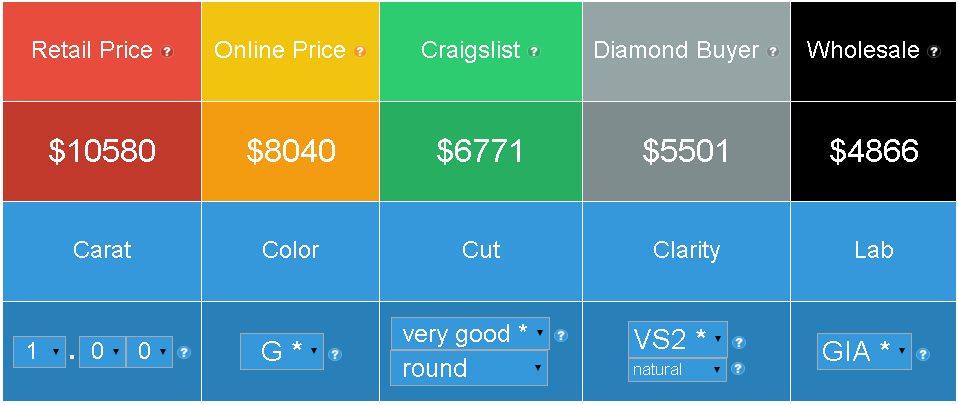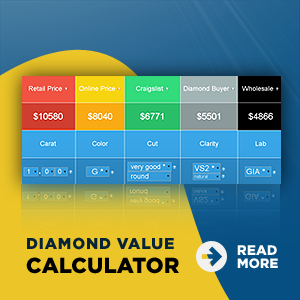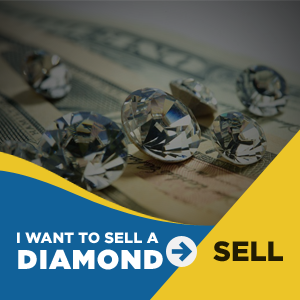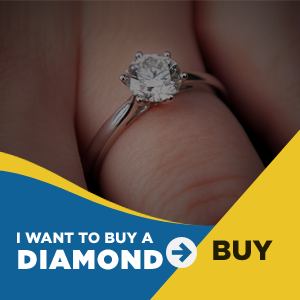“Diamonds are forever.”
Or so they say. While the statement is undoubtedly true — diamonds are strong and resilient and can last for pretty much forever — it only applies to the diamond itself. Not it’s value, and often not how special it is to you. Which means that if you are trying to sell your diamond jewelry, you’ll find that you will not be able to sell them for the same price that you purchased them for. In fact, the unfortunate truth is that you’ll often end up selling your diamond at a significant loss.
Want to compare the different prices of diamonds? Our diamond value calculator shows 5 different prices of diamonds: the retail price, online price, diamond buyer price, private transaction price, and wholesale price.
However, if you’re looking to sell, this does not mean that you still can’t get the highest possible price. If you know the variety of factors that affect your diamond jewelry’s resale value, you can figure out the highest price you can sell it for and make sure you recoup as much of the purchase price as possible.
Below, you’ll find an in-depth look at all the factors that affect the resale value of diamonds. Read on to learn more.
The Value Of A Diamond – The 4 Cs
Before we look at what determines the resale value of diamonds, it’s good practice to understand what affects the original value of the diamond. More commonly known as the 4 Cs, these are:
- Clarity
- Color
- Cut
- Carat
Clarity
Clarity refers to the number of visible flaws (known as inclusions) present in the stone. It’s graded on a scale, usually using the system of the Gemological Institute of America (GIA).
Color
Color is graded based on whether the stone has any yellow hues present in it that might make it look tinted as opposed to colorless. When it comes to color, the more colorless the stone, the higher the grade.
Cut
Cut refers to the shape of the diamond’s facets, their arrangement, and number. In general, diamonds whose cut allows them to capture and reflect more light will get a higher grade.
Carat
Carat is the weight of the stone. Commonly used to measure the weight of gemstones and pearls, it’s equal to 0.2 grams. Bigger diamonds, which are rarer, have a higher value per carat than smaller ones.
Now that we know the basics, we can delve into estimating a diamond’s resale value and how that value will be affected by different factors.
Estimating The Resale Value Of A Diamond
To estimate the resale value of a diamond, you need to know it’s color, clarity, cut, and carat gradings and values. Enter those into our diamond price calculator, and we’ll provide approximate values of how much you can sell your diamond for through different avenues.

If you’re going to sell private, it also makes sense to find other diamonds that share similar properties and use their market value as a reference. That should at least get you in the right ballpark when it comes to valuing your diamond’s worth.
Figuring Out Quality Grades And Market Value
At this point, you might be asking “How do I find out the quality grades for my diamond?” The answer often lies in the grading certificate, which many stones often come with. If you don’t have a grading certificate, you can and should send the diamond into the GIA or another grading lab to have it certified for a small fee. Having your diamond graded is always a good idea, as it will not only provide information that will help you determine the diamond’s value, but also be a valid proof of quality when you are trying to sell your diamond jewelry.
You also have the option to have your diamond appraised by a qualified appraiser. This will get you a firm answer about the market value of your particular diamond — you won’t have to guess or compare to other similar stones. While you most likely won’t be able to sell it at market value, the documentation can help you get a higher price. As a fun bonus, appraisals most often also include a grading report with details on the 4 Cs.
How Much Is Your Diamond Worth?
Now you have some numbers, but we still haven’t answered the question about exactly how much your diamond is worth.
The answer is about 20% to 60% of the average retail price of similar stones. We did tell you that you would be taking a significant loss.
Unfortunate, but true.
There are several reasons for this, but the main reason as to why resale prices for diamonds are so low is because jewelers will often buy diamonds in bulk. Buying in bulk means wholesale prices, which are much lower than retail prices. Whatever amount you paid for your stone at the store is much higher because it includes overhead expenses (rent, personnel salaries, and more) as part of the price.
Since there really is no reason for jewelers to pay you the retail price when they can get diamonds for much cheaper from diamond dealers, you end up taking the hit.
Other Factors Involved In How Well Your Diamond Holds Its Value
In addition to the ones listed above, there are also two other important factors that dictate the resale value of your diamond. They are:
- How and where did you buy your diamond jewelry?
- How and where are you going to sell your diamond jewelry?
How and where did you buy your diamond jewelry?
We’ve already explained that if you buy a diamond from a jewelry store, you won’t just be paying the market value of the stone, but also whatever markup is added to the price by the retail store that is selling you the diamond.
This markup will differ depending on where you buy the diamond.
Think about it: retail jewelers get the diamonds from wholesale diamond dealers who get their diamonds from diamond manufactures. At each point in this chain, there will be an additional margin added. Which means that by the time you purchase the diamond from the retail jeweler, the price you pay will have inflated quite a bit.
With brick-and-mortar jewelers, the fact is that you might end up paying a 100% markup. That translates to you paying twice whatever amount the jeweler paid to the wholesaler for the very same diamond.
Whereas if you bought the diamond online, the markup you’ll be paying will be significantly lower. Usually around 20% or so.
What this means is that while you won’t ever make a profit reselling a diamond, the place where you bought it from can influence how much you lose no matter where you try to sell it. Obviously, you lose less if you bought it online and more if you bought it at a physical jeweler.
How and where are you going to sell your diamond jewelry?
In addition to the other factors involved, the actual price you get for your diamond will also depend on how and where you sell the stone.
First off, if you are selling your diamond for cash at a pawn shop, you’ll almost certainly be taking the worst possible option. If you’re selling to a jewelry store, you could take credit to make another purchase from them. If they do, more often than not, the credit you get to spend on the store will usually be higher than whatever price they would pay to buy the diamond for cash — that is, if the jeweler buys diamonds for cash in the first place, which not all of them do. The problem there of course is that you’re paying retail for new jewelry again… which as we discussed isn’t a good idea.
Of course, the price will also depend on who you are selling your diamond to. For example, a person directly buying the diamond from you is almost certainly more likely to be willing to pay a higher price than whatever a jeweler would. As a rule, the further the buyer is from a retail point of sale, the less you are going to get. Which means that a wholesale diamond dealer will not be paying you more than a retail jeweler would. Going by that logic, your best bet for a higher price is to try and sell it to an individual, if you can find one who wants to buy diamond jewelry from another individual in the first place.
Selling a high-priced diamond in a private sale can be risky though. You could get ripped off, or pay high commissions to an online marketplace and try to transact through the mail. You’ll also need to negotiate with multiple buyers, and in general go through a lot of hassle to sell your diamond.
At Diamond Karma, we offer diamond selling services that help you sell directly to diamond buyers. You may receive less than a private sale, but our competitive marketplace helps you get the best price among diamond buyers and ensures you’re working with a trusted seller. To learn more about our comparison tool and see our list of our diamond buyers, view our Sell a Diamond page.
The Value Of Diamonds Over Time
Before we wrap things up, you might be wondering if it’s better to hold on to a diamond in case it’s value goes up over time.
Short answer: it’s not.
While diamond prices often fluctuate, they have been steadily declining for the past decade. Which is enough reason for you to not hold on to your diamonds to try and get a better deal.
But beyond that, diamonds generally don’t increase significantly in value over time. Don’t get us wrong, there are the rare and valuable diamonds — ones that are almost pieces of art themselves — that do increase in value. However, the vast majority of the diamonds, especially at the consumer level, have only decreased in value over the years making them bad choices for investments.
Which in turn also makes it a really bad idea to hold on to them to try and sell it at a higher price later. So don’t.
The increasing popularity of lab-grown diamonds also weighs on the price of natural diamonds. However, lab-grown diamonds have almost NO resale value. So if you want your diamond to at least hold some of its value, you need to purchase a natural diamond.
Diamonds Are Not Quite Forever
To conclude, while a diamond will always maintain its brilliance, the truth is that the value of the diamond will not always remain the same. While they have some resale value — and you will get some of your money back if you decide to sell your diamond jewelry — you will almost always lose more than you gain.
So if you are thinking of selling your diamond jewelry, make sure you do your research, figure out the exact market value and grade of your stone, and think about how and where you want to sell it.
After all, just because you are not going to make any profit, it doesn’t mean you have to settle for a lower value, right?
And if you have any other diamond related questions you need answering, get in touch with us and we’d be glad to help you out.







